ASIA
home > projects > asia
North Korea
North Korea / First Steps Project 2018
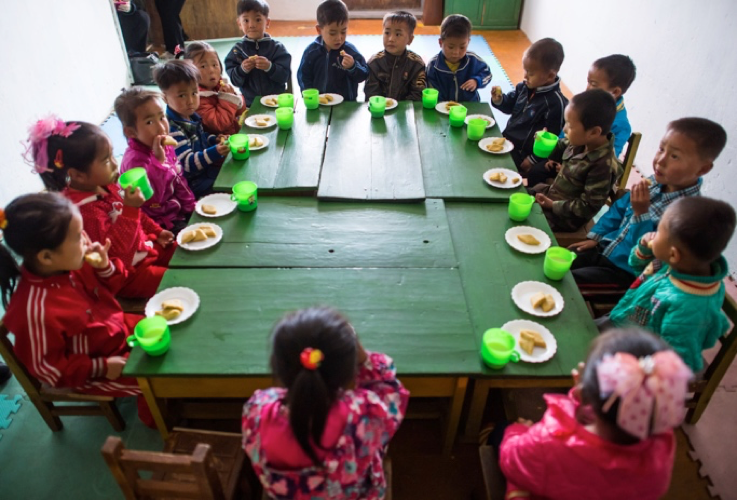
Samjion Potae Daycare
On May 17th, 2018 “First Steps” had a team of 5 travelling to North Korea to further their long-term program of soymilk and nutritional fortification for schools, daycares and orphanages. The flight’s cargo included three more SoyCows, bringing their total number of systems (including VitaGoats) to 98. The team visited five cities and also brought two of the SoyCows with them to two new soymilk production sites in Yonsa and Pochon. More than 100,000 children in daycares, kindergartens and orphanages currently receive a daily fresh serving of soymilk under this program, which is now in its 15th year.
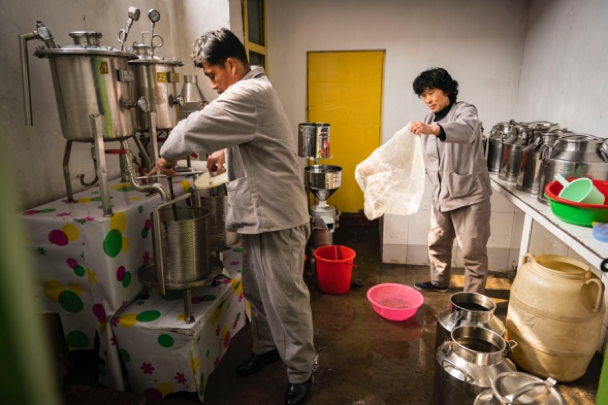
Nampo Hangdu daycare and kindergarten supply center with twin SoyCow systems.
Many of the soymilk operations are in centralized facilities with several systems operating and delivering the milk daily to their region, often by bicycle. Protein malnutrition is chronic among many children in DPRK and the daily soymilk serving provides the critical amount of protein needed. First Steps also provides good quality soybeans for all the operations. More systems are planned to be provided for this successful program later this year.
2014 – 10th Anniversary of VitaGoat / SoyCow Program
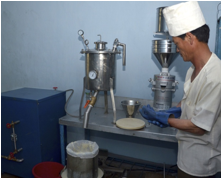
Worker producing with SoyCow E System
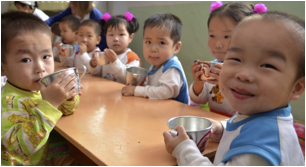
Children receiving their daily soymilk serving.
Current estimates by First Steps Canada, show that approximately 100,000 children are now receiving daily servings of soymilk under this program. The first system was flown in to Pyongyang in 2004 as a pilot project to provide soymilk to vulnerable children and orphans. The program grew exponentially over the years - there are now a total of 88 systems (52 VitaGoats and 36 SoyCows). Four more are currently being shipped including the fourth "SuperCow" which is simply a larger, double capacity SoyCow powered by an 18 kW electric boiler. In parallel with these developments, First Steps has also been providing container loads of high quality Canadian soybeans, as well as "Sprinkles" nutritional supplements which can be dissolved in the soymilk.
Myanmar 2015
Fifteen SoyCow and VitaGoat systems have been installed in Myanmar, mainly in and around Yangon, between 2010 and 2015. MM has worked with various partners including Stand As One Ministry and World Concern. One system is providing about 200 children at a school for the blind, with servings of about 250 ml (one cup) of soy milk. Another system is at a larger school and is currently feeding approximately 700 to 800 kids per day with about 250 ml each of soy milk. Tofu is also made and served as a supplement.
Also important is that a technology transfer for the VitaGoat system has been completed to MCEG1, a company located in Yangon. MCEG1 has built several VitaGoat systems that have been installed locally.

Soymilk being produced by a VitaGoat system in Yangon.
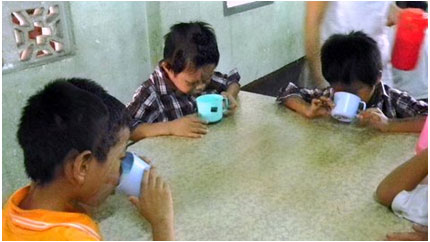
Children at school for the blind in Yangon receiving their soymilk servings.
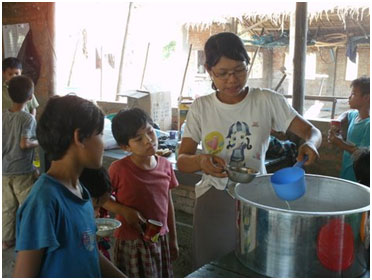
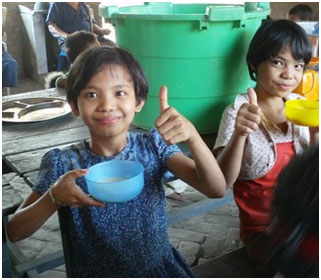
Children at larger school in Yangon being served their daily soymilk from the SoyCow.
North Korea 2009 Update
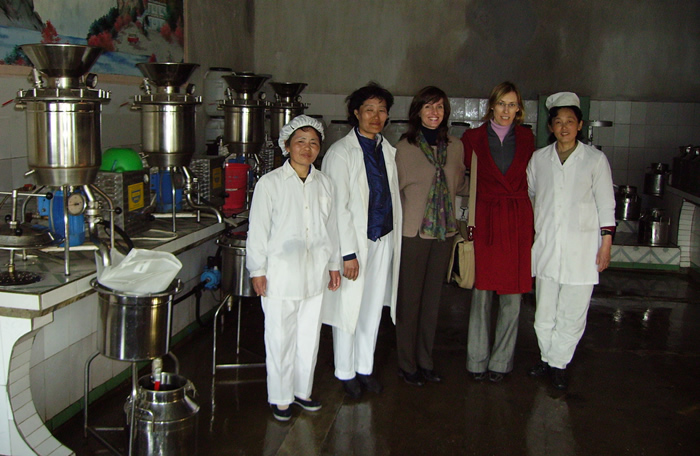
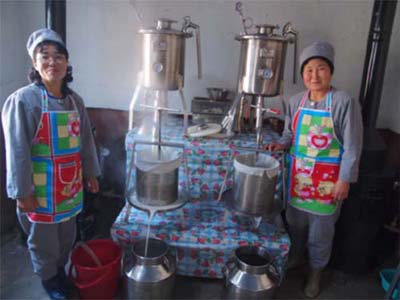
Workers at one center in Wonsan with double VitaGoat system = 60 L/hour soymilk
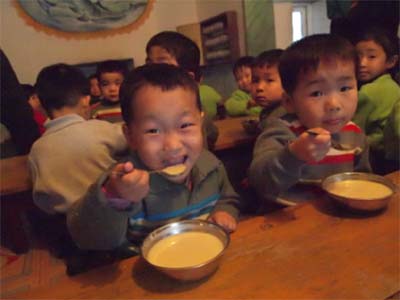
Children at orphanage with daily soymilk porridge. The okara is included in the sweetened porridge. Micro-nutrients are also sometimes added.
First Steps is a Canadian-based Christian humanitarian organization whose purpose is to prevent childhood malnutrition in North Korea through programs which provide essential nutrients to young children.
As of December 2009, 22 soymilk production centers were running with a total of over 50 VitaGoats and SoyCows. Approx 80,000 children are getting daily servings of soymilk or soy porridge by the First Steps program. A second technical visit by an MM specialist, in March of 09, provided some trouble shooting and upgraded training at multiple locations. This program has been running since the first system was provided in 2003. High quality Canadian soybeans are now also supplied by First Steps since supplies from neighboring China are not always available or of reliable quality.
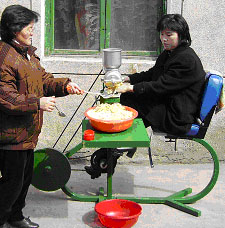
The cycle grinder is used to make the soy mash before cooking.
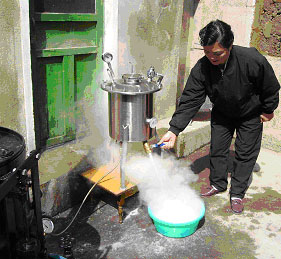
First VitaGoat trial in Hongjesan: Hot soymilk is released from the cooker (with boiler shown at left).
Since 2003 First Steps has placed the electrical VitaCow machines (a previous model of the SoyCow) in soymilk factories in the urban areas of Wonsan, Nampo and Hyongjesan. These benefit children in orphanages, kindergartens and daycares.
The pedal-powered and biomass-fueled (wood, corn cobs, etc.) VitaGoat has effectively been placed in areas of the DPRK where electricity is scarce. VitaGoat machines have been placed on cooperative farms in the east coast Tongchon area and the west coast Nampo region, where they provide soymilk to kindergarten and daycare children of the communities nearby.
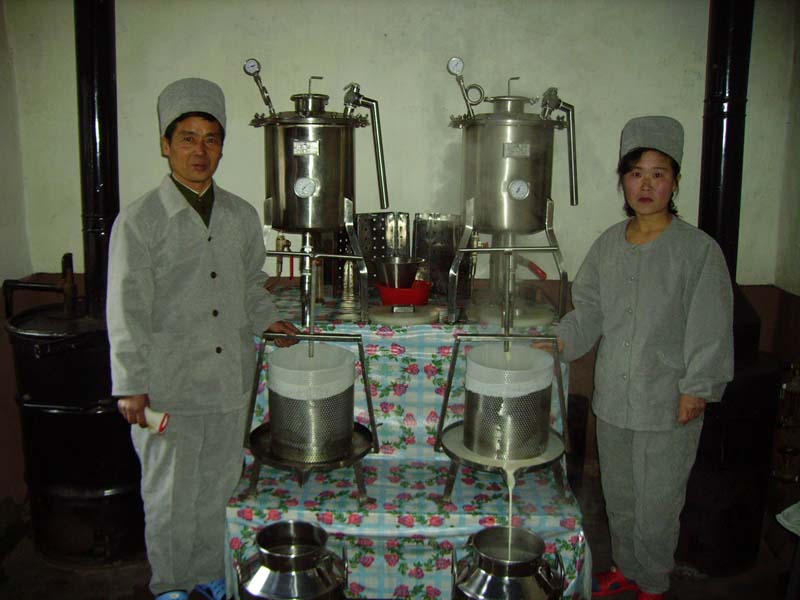
Two VitaGoats at facility in Nampo serving multiple schools and orphanages.
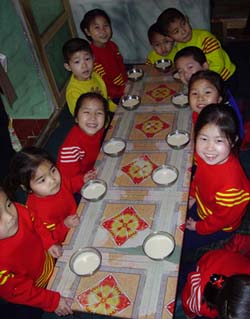
Children at orphanage getting their daily serving of soymilk.
As there are many health benefits in soymilk, First Steps makes supplying this nutritious drink a priority. Soybeans are considered a complete source of protein, contain no cholesterol, and contain powerful antioxidants that help fight disease. Soymilk is also known to increase bone density and strengthen the immune system.
Partners in North Korea say that children who receive soymilk get sick less often, have better attendance and perform better in school. School directors, doctors, and staff that receive soymilk rations for the children in their care are extremely positive about the benefits of soymilk. Officials are also enthusiastic about First Steps programs and have recently requested that more sites be established to help more children.
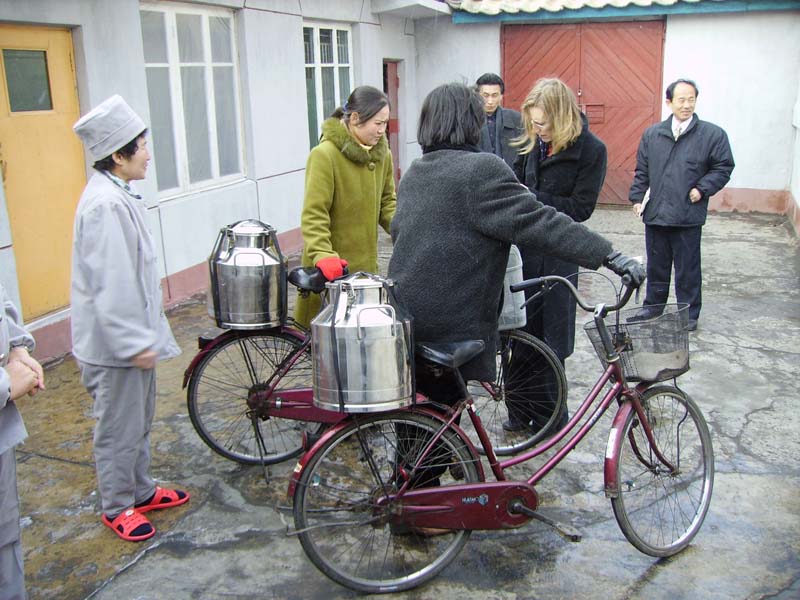
First Steps Director Susan Ritchie with women delivering soymilk to local schools and orphanages.
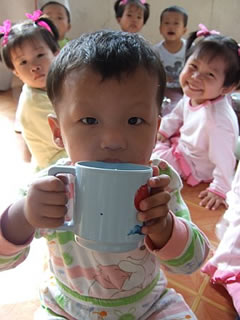
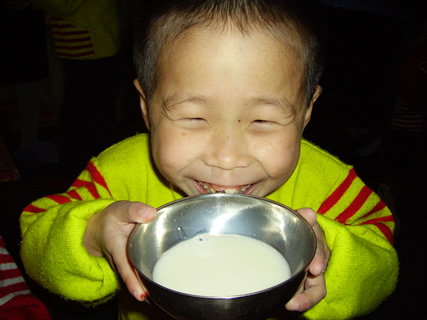
Children getting their Soymilk for the day
Children's Development Centre Mae Sot 2009 (Thailand)
The Children's Development centre is a school and orphanage for Karen and other Burmese children. It houses approximately 250 children from preschool age up to high school. There are also two refugee camps close to CDC with close to 75 000 residents. They are located just outside Mae Sot Thailand and also run a school in Mae Sot that is funded by a private donor in Australia. The school in Mae Sot currently runs a Fish Farm as well as several other for-profit enterprises to subsidize their organization. This demonstrates that they are already successful in running for-profit entrepreneurial endeavors. The machine is housed inside a cement structure with adequate ventilation and access to water (including filtered water). In Mae Sot we found several street vendors selling home mad tofu. Also, the local grocers carry at least five different brands of soy milk with a variety of flavours.
The VitaGoat for this project was co-funded by Gateway Baptist Church (Surrey , BC, Canada) and Donner Canadian Foundation.
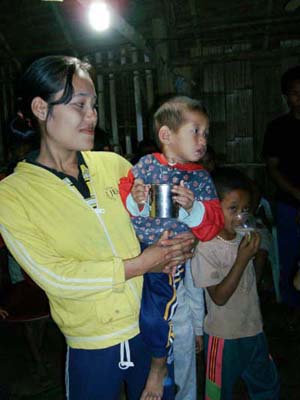
Mother and children enjoying their soymilk
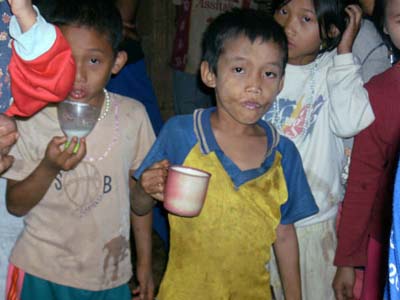
Children in these camps are generally under-nourished
Mae La Oon Refugee Camp Project 2008 (Thailand)
Operated by members of the local Sheelo Baptist Church
This enterprise is set up at one of the most remote locations on earth. It is hard to get communication in or out and supplies are expensive. The Irrawaddy Magazine reported last month that the financial crisis has led to a drying up of donor support for the Karen refugees in Thailand and as a result, a black mood has settled over the residents of the nine camps and a sense of hopelessness has seized the Karen people resulting in increased suicides and other social problems. The machine has been run regularly producing milk for school children and on special occasions. In the camp, a 50kg bag of Soy costs 630 Baht (about CAD $21). With all expenses factored in, it costs about 350 Baht to give soymilk to 80 to 100 people per day (CAD $11.16).
The VitaGoat for this project was co-funded by Gateway Baptist Church (Surrey , BC, Canada) and Donner Canadian Foundation.
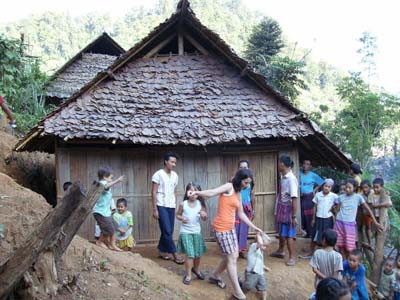
House that shelters the VitaGoat
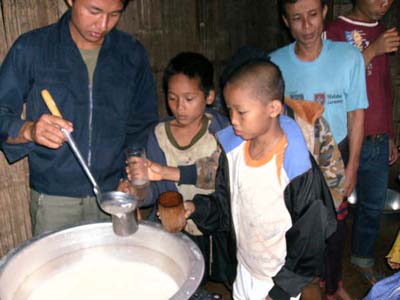
Children Getting their soymilk for the day
Stay Up to Date
Questions?
Request more information from matters@malnutrition.org
© 2025 Malnutrition.org | Malnutrition Matters. All Rights Reserved.
